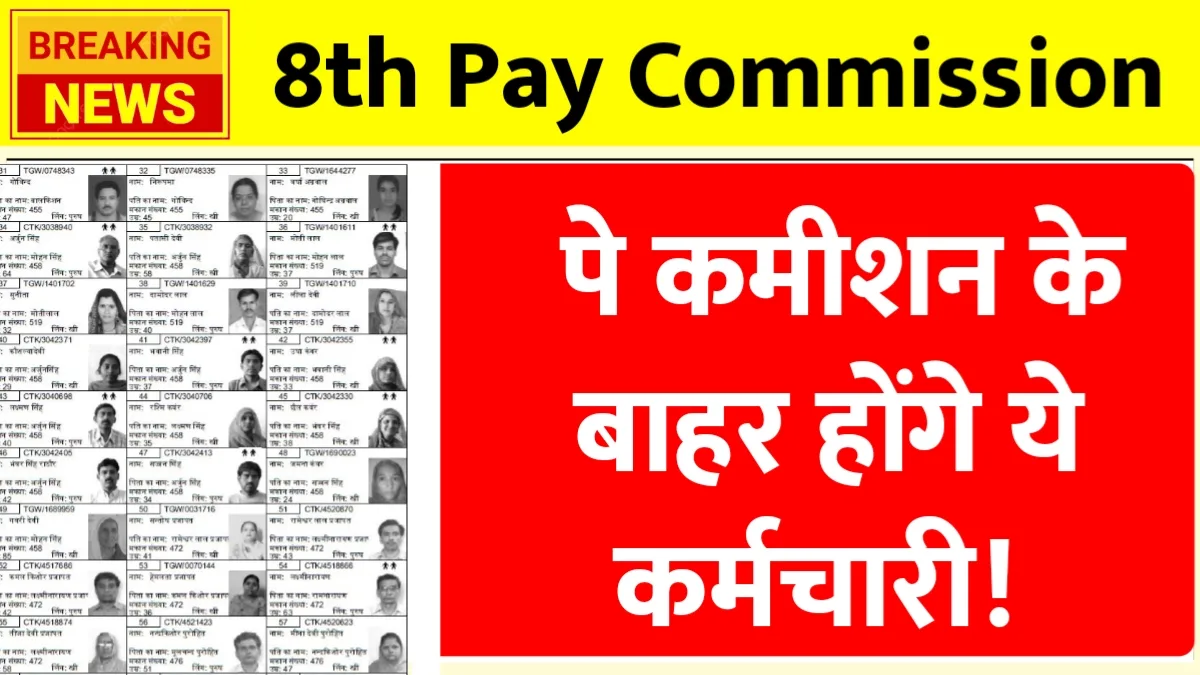8th Pay Commission: The central government has approved the formation of the Eighth Pay Commission in January 2025, after which there has been a wave of happiness among the government employees. After this announcement, lakhs of central employees are expecting a big increase in their salary. Usually a new pay commission is implemented every ten years and this tradition has been going on for many decades. Currently the Seventh Pay Commission is in force which has been going on since 2016. Now with the Eighth Pay Commission, central employees are hoping to improve their financial condition.
Background of Seventh Pay Commission
The Seventh Pay Commission was constituted in 2014 and implemented in 2016. This Pay Commission had significantly increased the salary of central employees and many allowances were also revised. Under the Seventh Pay Commission, the minimum salary was increased from Rs 7000 to Rs 18000. Apart from this, there was a significant increase in dearness allowance and other allowances. Now employees are expecting even better results from the Eighth Pay Commission. But it is important to know that not every government employee will get its benefit.
Employees outside the purview of Pay Commission
Not all government employees are going to get the benefit of the Eighth Pay Commission. Employees of some special categories are outside the purview of this Pay Commission and they will not get its direct benefit. Employees working in public sector undertakings do not come under the Pay Commission. Apart from this, employees working in various autonomous institutions also come under this category. Judges of the High Court and Supreme Court are also outside the purview of the Pay Commission because there is a separate system for their salaries and allowances.
Different rules for special institutions
For employees who are outside the purview of the Pay Commission, separate rules for salaries and allowances have been made. These institutions have their own boards or governing bodies which are responsible for salary fixation. These institutions fix salaries keeping in view their financial situation and market conditions. Many times these institutions give proportional salary hike to their employees based on the recommendations of the Central Pay Commission. But this is not mandatory and depends entirely on the decision of the concerned institution.
Possibilities of Fitment Factor
In the Eighth Pay Commission, the fitment factor will be an important component that will determine the salary hike. According to sources, this time the fitment factor can be between 1.92 to 2.86. If this estimate proves to be correct, then the minimum basic salary of central employees can increase from Rs 18000 to Rs 51000. However, there is no official confirmation of this yet and this is only an estimate. The final determination of the fitment factor will be done only after the recommendations of the Pay Commission and the approval of the government.
Calculation Method of Fitment Factor
The fitment factor is a coefficient used to calculate the salary hike of government employees. The new salary is determined by applying it to the current basic salary. For example, if the current basic salary of an employee is Rs 20000 and the fitment factor is fixed at 2.50, then his new basic salary will be 20000 multiplied by 2.50 i.e. Rs 50000. This calculation is done only for the basic salary and apart from this, various allowances are added separately. The fitment factor is determined by keeping in mind inflation, cost of living and other economic factors.
Widespread effects of the Pay Commission
The impact of the Eighth Pay Commission will not be limited to salary hikes only but it will also bring revisions in various allowances. Dearness Allowance, House Rent Allowance, Travel Allowance and all other allowances are likely to increase. Pensioners will also benefit from this as their pension will also be increased on the basis of revised pay. There will also be pressure on the state governments to revise pay for their employees on the lines of the Centre. This will improve the economic condition of government employees across the country and will also increase consumption demand.
Future Prospects and Challenges
Implementing the recommendations of the Eighth Pay Commission will be a big challenge for the government as it will lead to a significant increase in government expenditure. The government will have to ensure that along with the salary hike, there is also improvement in the quality and efficiency of work. The Pay Commission will submit its recommendations in the coming months and after that the government will take steps towards implementing them. Employees will have to be patient and wait for the official announcement.
Disclaimer
This article is written for general information purpose. All information related to 8th Pay Commission is based on estimates and media reports. Wait for the official announcement for the exact information on the increase in salary and allowances. Be sure to confirm from government sources before taking any financial decision.


